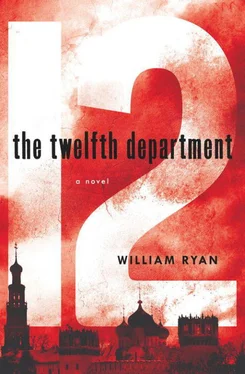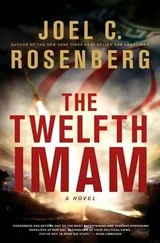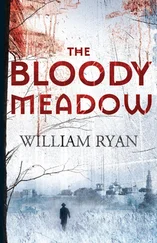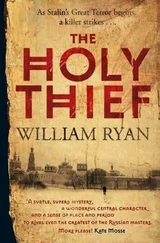“Can I help you?”
Korolev turned to find himself face-to-face with a stout man dressed in a white shirt, the top three buttons of which were open—a tuft of grey chest hair and the top of a string vest poking out.
“You are?” Korolev asked.
“I’m the director of the orphanage. Spinsky.” He looked none too pleased to be separated from his supper, but Korolev didn’t care. If Spinsky thought he had it tough he should walk in Korolev’s shoes for half an hour and see how he liked them.
“Captain Korolev, Moscow CID. I’ve some questions for you.”
“It’s late.”
Korolev said nothing and Spinsky, after a brief pause, sighed and nodded.
“All right then. Is this about the missing boys?”
“Which missing boys would these be?” Korolev asked, more than a little curious.
“Two of them absconded from a trip to Peredelkino. We’ve sent the children out there for the week.”
Korolev said nothing. His heartbeat sounded loud in his ears.
“Are you all right?” Spinsky asked.
“When was this?”
“Last night. Listen, what’s all this about?”
“Have you photographs of them?” Korolev said, ignoring the question. “The boys that ran, that is.”
“I should think so.”
The director led him outside into the corridor and indicated a low door. “My office.”
“Do you mind my asking—would one of these two runaways be called Goldstein?”
Spinsky looked over his shoulder as he inserted a key into its lock. “Yes, have you found him?”
Last night—the same night Yuri had disappeared—two orphans make a run for it. This morning, three boys are seen at the next station along from Peredelkino. One of them—perhaps—Yuri; and another—perhaps—Kim Goldstein.
“Not yet,” Korolev said, his voice much calmer than he felt.
“Please, take a seat,” Spinsky said, opening the door.
“Can you tell me the circumstances? How they managed it?”
“I wasn’t there, but the children were missing in the morning—they must have slipped over the wall at some stage. It’s less secure out there and, well, it’s not unusual. We don’t run a prison camp.”
“I know Goldstein lived on the streets, what about this other fellow?”
“Yes, Petrov is his name. They came in together in January—the winter’s our biggest recruiter among street children.”
“Together. Was there a gang of them came in at the same time?”
“I think so, I’d have to check.”
Goldstein’s gang. The Razin Street Irregulars, or so he’d once called them.
“Have you reported their running away to the Militia?”
Spinsky glanced up. “We used to. But it takes a long time to make the report and nothing ever comes of it. I’m sorry if that seems blunt.”
Which would explain why no one had made the connection. Still, if Yuri was with him the chances were they’d be visiting Goldstein’s old haunts—and Korolev knew someone who’d know where at least some of those were.
“Could you check who came in with them? It might be useful. I know a bit about Goldstein and his crew.”
The director frowned. “All right.”
He pulled a heavy ledger from the shelf beside his desk and opened it up, flicking through the pages.
“There were five of them.”
“May I see?”
The director pushed the ledger across and Korolev ran his finger down the column of names until he found Goldstein’s. There were four other children admitted the same day. Beside Goldstein’s name and that of Petrov someone had written an “R” in red ink and today’s date.
“The ‘R’ means?”
“Run.”
“This is the other fellow, is it? Petrov? You said you might have photographs of them.”
“Yes, of course.” The director stood and walked to a filing cabinet, opening the drawers until he came back with two files.
“Two of these have an ‘A’ beside them and one a ‘D,’” Korolev said, looking at the ledger entries. “What do they mean?”
“The ‘D’ means deceased—they were in poor shape when they came in and the boy caught influenza, if I remember. He didn’t make it. The other two were transferred to the Azarov Institute.”
Korolev nodded calmly, although he felt anything but calm. In fact he could feel energy racing round his body looking for a way out. He reached into his pocket for his cigarettes—it was the only thing he could think of.
“Do you mind if I smoke?”
“Help yourself.”
Korolev looked at the fingers that held the match as he lit his cigarette; they were steady. He wasn’t sure how.
“Professor Azarov’s wife works here, of course,” he said, somehow managing to speak in a neutral tone of voice.
“Listen, Comrade. What’s this all about? I understand you’re with Petrovka, but if I knew what you were looking for perhaps I could help you more.”
“I am with Petrovka,” Korolev said. “But I’ve also been assigned to State Security on a certain matter. You should know State Security doesn’t answer questions, it asks them. I can show you my letter of authority, if you wish.”
Spinsky looked doubtful, but then he seemed to reconsider. He swallowed before nodding slowly.
“Very good. Yes, Comrade Azarova comes three times a week. I’ll be honest, some of our boys are resistant to socialism, and she’s been of great assistance in our re-education efforts.”
“When exactly? When does she come in, that is?”
“Monday morning, Tuesday morning, and Friday morning, I think. She’s with us from eight-thirty until about twelve. She works with other orphanages as well though, on other days and in the afternoons.”
“So she was here on Monday and Tuesday of this week?”
“Monday morning certainly—I saw her myself. Tuesday morning—I can’t say for sure because I was out with the boys in Peredelkino—but if she was here, she’d have been here on her own, more or less. All the boys that weren’t in the infirmary were put on buses first thing.”
Korolev had been looking through the skimpy files on Goldstein and Petrov. He was sure he recognized Petrov—one of the boys who’d been talking to Yuri by the riverbank. He was another one like Goldstein—reserved. Not without confidence, or something similar—stubbornness perhaps.
“When you say these other two were transferred to the Azarov Institute? What does that mean?”
“It means exactly what I say—we’ve worked alongside the Azarov Institute for three years now. Most of the children spend a few weeks over there from time to time—if the professor identifies children who will be able to serve the State by assisting him further in his scientific research, they are permanently transferred to his establishment. Most come back, however.”
“I didn’t know he ran an orphanage over there.”
The director shrugged his shoulders.
“I don’t know what he runs over there, Comrade Captain. It isn’t the kind of place you ask questions about. While the children are over there they participate in some neurological testing, I believe. Ones that are particularly suitable stay with them. The boys envy the ones that stay, I can tell you.”
“When you say neurological testing…?”
“I don’t know for sure. The children who come back—well, sometimes they’ve got small scars, just here.” The director pointed to his cheek, at exactly the same place as the murdered Shtange been cut with a scalpel and where Goldstein had a half-healed gash. “Nothing to worry about. The boys are proud of them.”
“But you have no further contact with them, the ones that stay? You never see them again?”
That seemed to be what Spinsky was saying. The director looked uncomfortable at the bluntness of the question and, for some reason, began to do up the buttons on his shirt, then undo them.
Читать дальше












